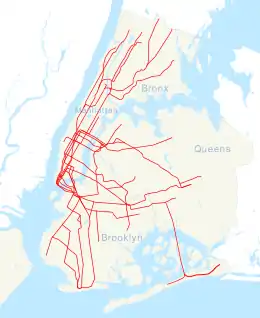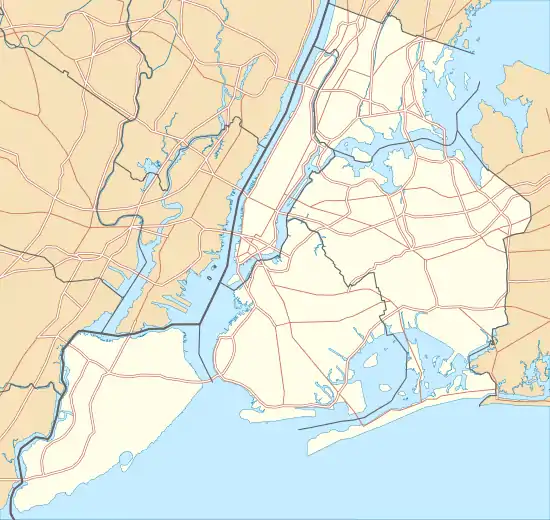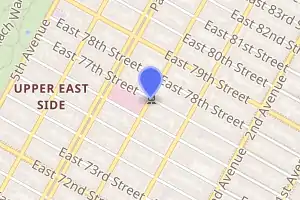77th Street station (IRT Lexington Avenue Line)
77th Street (also known as 77th Street–Lenox Hill Hospital) is a local station on the IRT Lexington Avenue Line of the New York City Subway, located at the intersection of Lexington Avenue and 77th Street on the Upper East Side of Manhattan. It is served by the 6 train at all times, the <6> train during weekdays in the peak direction, and the 4 train during late nights. This station was constructed as part of the Dual Contracts by the Interborough Rapid Transit Company and opened in 1918.
77 Street | ||||||||||||||||||||||||||||||||||||||||||||||||||||||||||||||||||||
|---|---|---|---|---|---|---|---|---|---|---|---|---|---|---|---|---|---|---|---|---|---|---|---|---|---|---|---|---|---|---|---|---|---|---|---|---|---|---|---|---|---|---|---|---|---|---|---|---|---|---|---|---|---|---|---|---|---|---|---|---|---|---|---|---|---|---|---|---|
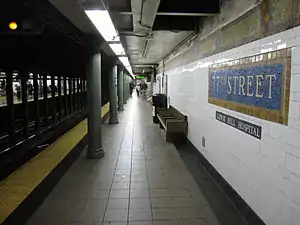 Uptown platform | ||||||||||||||||||||||||||||||||||||||||||||||||||||||||||||||||||||
| Station statistics | ||||||||||||||||||||||||||||||||||||||||||||||||||||||||||||||||||||
| Address | East 77th Street & Lexington Avenue New York, NY 10075[1] | |||||||||||||||||||||||||||||||||||||||||||||||||||||||||||||||||||
| Borough | Manhattan | |||||||||||||||||||||||||||||||||||||||||||||||||||||||||||||||||||
| Locale | Upper East Side | |||||||||||||||||||||||||||||||||||||||||||||||||||||||||||||||||||
| Coordinates | 40.773587°N 73.959875°W | |||||||||||||||||||||||||||||||||||||||||||||||||||||||||||||||||||
| Division | A (IRT) | |||||||||||||||||||||||||||||||||||||||||||||||||||||||||||||||||||
| Line | IRT Lexington Avenue Line | |||||||||||||||||||||||||||||||||||||||||||||||||||||||||||||||||||
| Services | 4 6 | |||||||||||||||||||||||||||||||||||||||||||||||||||||||||||||||||||
| Transit | M79 SBS at 79th Street[2] | |||||||||||||||||||||||||||||||||||||||||||||||||||||||||||||||||||
| Structure | Underground | |||||||||||||||||||||||||||||||||||||||||||||||||||||||||||||||||||
| Platforms | 2 side platforms | |||||||||||||||||||||||||||||||||||||||||||||||||||||||||||||||||||
| Tracks | 2 | |||||||||||||||||||||||||||||||||||||||||||||||||||||||||||||||||||
| Other information | ||||||||||||||||||||||||||||||||||||||||||||||||||||||||||||||||||||
| Opened | July 17, 1918[3] | |||||||||||||||||||||||||||||||||||||||||||||||||||||||||||||||||||
| Station code | 398[4] | |||||||||||||||||||||||||||||||||||||||||||||||||||||||||||||||||||
| Opposite- direction transfer | No | |||||||||||||||||||||||||||||||||||||||||||||||||||||||||||||||||||
| Former/other names | 77th Street–Lenox Hill Hospital | |||||||||||||||||||||||||||||||||||||||||||||||||||||||||||||||||||
| Traffic | ||||||||||||||||||||||||||||||||||||||||||||||||||||||||||||||||||||
| 2019 | 7,821,286[5] | |||||||||||||||||||||||||||||||||||||||||||||||||||||||||||||||||||
| Rank | 46 out of 424[5] | |||||||||||||||||||||||||||||||||||||||||||||||||||||||||||||||||||
| Station succession | ||||||||||||||||||||||||||||||||||||||||||||||||||||||||||||||||||||
| Next north | 86th Street: 4 | |||||||||||||||||||||||||||||||||||||||||||||||||||||||||||||||||||
| Next south | 68th Street–Hunter College: 4 | |||||||||||||||||||||||||||||||||||||||||||||||||||||||||||||||||||
| ||||||||||||||||||||||||||||||||||||||||||||||||||||||||||||||||||||
| ||||||||||||||||||||||||||||||||||||||||||||||||||||||||||||||||||||
| ||||||||||||||||||||||||||||||||||||||||||||||||||||||||||||||||||||
| ||||||||||||||||||||||||||||||||||||||||||||||||||||||||||||||||||||
History
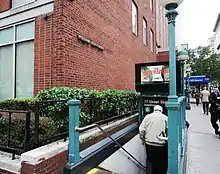
Following the completion of the original subway, there were plans to construct a line along Manhattan's east side north of 42nd Street. The original plan for what became the extension north of 42nd Street was to continue it south through Irving Place and into what is now the BMT Broadway Line at Ninth Street and Broadway. In July 1911, the IRT had withdrawn from the talks, and the Brooklyn Rapid Transit Company (BRT) was to operate on Lexington Avenue. The IRT submitted an offer for what became its portion of the Dual Contracts on February 27, 1912.[6][7]
In 1913, as part of the Dual Contracts, which were signed on March 19, 1913,[8] the Public Service Commission planned to split the original Interborough Rapid Transit Company (IRT) system from looking like a "Z" system (as seen on a map) to an "H"-shaped system. The original system would be split into three segments: two north–south lines, carrying through trains over the Lexington Avenue and Broadway–Seventh Avenue Lines, and a west–east shuttle under 42nd Street. This would form a roughly "H"-shaped system.[9][10] It was predicted that the subway extension would lead to the growth of the Upper East Side and the Bronx.[11][12]
77th Street station opened on July 17, 1918, with service initially running between Grand Central–42nd Street station and 167th Street via the line's local tracks.[3] On August 1, the "H system" was put into place, with through service beginning on the new east and west side trunk lines, and the institution of the 42nd Street Shuttle along the old connection between the sides.[13] The cost of the extension from Grand Central was $58 million.[14]
In the 1960s, additional entrances were constructed at the station. The contract was awarded to J. W. Jenkins, Incorporated for $409,726.[15]
This station was renovated in 2003.
Station layout
| G | Street level | Exit/entrance |
| P Platform level |
Side platform | |
| Northbound local | ← ← | |
| Southbound local | | |
| Side platform | ||
| Express tracks[16] | Northbound express | ← |
| Southbound express | | |
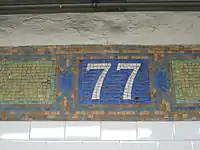
This station has two local tracks and two side platforms. The express tracks of the Lexington Avenue Line, used by the 4 and 5 trains during daytime hours, pass beneath the station and are not visible from the platforms.[17] The 6 stops here at all times, and the 4 stops here during late nights.[18][19]
Some old wall lights exist after the station's renovation in 2003, but most are gone or falling off the walls. Both platforms have emergency exits from the lower level express tracks.
The 2004 artwork here is called 4 Seasons Seasoned by Robert Kushner. It is installed on the ceiling above the fare control staircases and features mosaics related to the four seasons of the year.
Exits
Both platforms has a fare control, and both areas have a turnstile bank, and four staircases to the street. The northbound side has a pair of staircases to both eastern corners of Lexington Avenue and 77th Street, while the southbound side has a pair of staircases to both western corners of Lexington Avenue and 77th Street. There are no crossovers or crossunders to allow free transfers between directions.[20]
The downtown platform is the only platform in the station to house a token booth. The uptown platform token booth was closed by the Metropolitan Transportation Authority after making a series of layoffs and has been removed.
Nearby landmarks
- Lenox Hill Hospital[20]
- Hunter College School of Social Work
References
- "Borough of Manhattan, New York City". Government of New York City. Retrieved December 28, 2020.
- "Manhattan Bus Map" (PDF). Metropolitan Transportation Authority. July 2019. Retrieved December 1, 2020.
- "Lexington Av. Line to be Opened Today" (PDF). The New York Times. July 17, 1918. p. 13. ISSN 0362-4331. Retrieved April 21, 2020.
- "Station Developers' Information". Metropolitan Transportation Authority. Retrieved June 13, 2017.
- "Facts and Figures: Annual Subway Ridership 2014–2019". Metropolitan Transportation Authority. 2020. Retrieved May 26, 2020.
- Walker, James Blaine (1918). Fifty Years of Rapid Transit — 1864 to 1917. New York, N.Y.: Law Printing. pp. 230–233. Retrieved November 6, 2016.
- "Petition for Subway in Lexington Ave". The New York Times. May 22, 1912. ISSN 0362-4331. Retrieved February 16, 2009.
A petition is being circulated among the residents and property owners of the section just south of the Grand Central Station, in Park and Lexington Avenues, protesting against the proposed abandonment of the construction of the Subway in Lexington Avenue, between Forty-third and Thirty-second Streets.
- "Subway Contracts Solemnly Signed; Cheers at the Ceremonial Function When McCall Gets Willcox to Attest" (PDF). The New York Times. March 20, 1913. ISSN 0362-4331. Retrieved January 11, 2018.
- "Money Set Aside For New Subways; Board of Estimate Approves City Contracts to be Signed To-day with Interboro and B.R.T." (PDF). The New York Times. March 19, 1913. ISSN 0362-4331. Retrieved November 10, 2017.
- Engineering News-record. McGraw-Hill Publishing Company. 1916. p. 846.
- Whitney, Travis H. (March 10, 1918). "The Seventh and Lexington Avenue Subways Will Revive Dormant Sections — Change in Operation That Will Transform Original Four-Tracked Subway Into Two Four-Tracked Systems and Double Present Capacity of the Interborough". The New York Times. p. 12. Retrieved August 26, 2016.
- "Public Service Commission Fixes July 15 For Opening of The New Seventh and Lexington Avenue Subway Lines — Will Afford Better Service and Less Crowding — Shuttle Service for Forty-Second Street — How the Various Lines of the Dual System Are Grouped for Operation and List of Stations on All Lines". The New York Times. May 19, 1918. p. 32. Retrieved November 6, 2016.
- "Open New Subway Lines to Traffic; Called a Triumph — Great H System Put in Operation Marks an Era in Railroad Construction — No Hitch in the Plans — But Public Gropes Blindly to Find the Way in Maze of New Stations — Thousands Go Astray — Leaders in City's Life Hail Accomplishment of Great Task at Meeting at the Astor". The New York Times. August 2, 1918. p. 1. Retrieved November 6, 2016.
- "Finish a New Link of the Dual Subway; Lexington Avenue Line North of Forty-second Street to Begin Local Service Wednesday. Branch Extends to Bronx Through service, with Times SquareGrand Central Shuttle Connections, to Open Soon. Changes in the Bronx". The New York Times. July 11, 1918. p. 20. ISSN 0362-4331. Retrieved January 8, 2017.
- Minutes and Proceedings of the New York City Transit Authority. New York City Transit Authority. 1968. p. 235.
- Station Reporter — 6 Train
- Dougherty, Peter (2006) [2002]. Tracks of the New York City Subway 2006 (3rd ed.). Dougherty. OCLC 49777633 – via Google Books.
- "4 Subway Timetable, Effective September 13, 2020". Metropolitan Transportation Authority. Retrieved December 9, 2020.
- "6 Subway Timetable, Effective September 13, 2020". Metropolitan Transportation Authority. Retrieved December 9, 2020.
- "77th Street Neighborhood Map". mta.info. Metropolitan Transportation Authority. April 2018. Retrieved December 28, 2020.
External links
| Wikimedia Commons has media related to 77th Street (IRT Lexington Avenue Line). |
- nycsubway.org – IRT East Side Line: 77th Street
- nycsubway.org — 4 Seasons Seasoned Artwork by Robert Kushner (2004)
- Station Reporter — 4 Train
- Station Reporter — 6 Train
- MTA's Arts For Transit — 77th Street (IRT Lexington Avenue Line)
- 77th Street entrance from Google Maps Street View
- Platforms from Google Maps Street View
